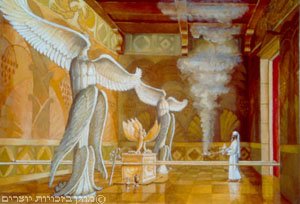|
The Zohar on the portion Pekudei1 speaks of the Mishkan , the Beis HaMikdash , and the placing of the Ark in the Beis HaMikdash’s Holy of Holies. When the Ark was placed there, says one opinion in the Zohar, the Ark said:2 “This is my eternal resting place; here I shall dwell, for I desire it.”
According to another opinion, this verse was recited by the Jewish people when the Beis HaMikdash was completed and the Ark was placed in the Holy of Holies. There is yet a third opinion, namely, that “G-d recites this verse regarding the Jewish people when they obey His will.”
Since all three opinions are mentioned in the Zohar in conjunction with its discussion of the Mishkan , Beis HaMikdash , and the placing of the Ark, it follows that all three opinions relate in some way to the Mishkan and Beis HaMikdash.
How does the final opinion relate to the Zohar’s earlier discussion regarding the Mishkan, etc., when according to this interpretation the verse is speaking of G-d eternally dwelling within the Jewish people? Moreover, why the difference of opinion as to who recites this verse?
The difference between these three views stems from different attitudes regarding the primary purpose of the Mishkan and Beis HaMikdash :
The first opinion maintains that the principal purpose of, and desire for, the Mishkan was in order that there be a resting place for the Divine Presence, as it dwelled within the Ark.3 Thus it says that the Ark recited this verse.
The second comment holds that the main purpose of the Mishkan and Beis HaMikdash was to give the Jewish people an established place in which to serve G-d.4 This was accomplished upon the completion of the Mishkan and Beis HaMikdash and the placement of the Ark in the Holy of Holies. It therefore holds that the Jewish people recited the verse.
The third opinion contends that the chief purpose of the Mishkan and Beis HaMikdash was that the Divine Presence reside among the Jewish people5 — G-d’s “resting place” is dependent upon the Jewish people. Thus it was G-d who recited this verse regarding the Jewish people.
The three views, however, are in basic agreement; all three considerations are of primary importance for the Mishkan and Beis HaMikdash ; they merely refer to different time periods.
The structures involved represent several distinct phases: the Mishkan , the first and second Beis HaMikdash , and the future Beis HaMikdash.
The Mishkan first and foremost allowed for the dwelling of the Divine Presence within the Ark. Moreover, the permanent “resting place” of the Ark was primarily in the Mishkan , for the second Beis HaMikdash was without the Ark6 while the first Beis HaMikdash was partially deprived of it.7 The first opinion thus refers to the time of the Mishkan.
The full meaning of “a resting place,” however, cannot be applied to the Mishkan , for it moved from place to place. Both the first and second Beis HaMikdash were stationary. The Jewish people could therefore realize their dream of a permanent place for the service to G-d only in relation to the Beis HaMikdash , and not the Mishkan.
But both the first and second Beis HaMikdash were destroyed because of the iniquities of the Jewish people. Thus, in terms of “G-d reciting this verse regarding the Jewish people when they obey His will,” this could not apply to the first and second Beis HaMikdash.
It is only with regard to the third (and everlasting) Beis HaMikdash that G-d recites the verse. For then the Jews will fully obey His will, and the Divine Presence will wholly unite with, and reside within them. G-d will thus be able to say of the Jews: “This is My eternal resting place; here I shall dwell, for I desire it.”
Based on Likkutei Sichos Vol. XXI, pp. 260-263.
FOOTNOTES
1. 222b.
2. Tehillim 132:14.
3. See Ramban beginning of portion Terumah.
4. See Rambam, beginning of Hilchos Beis HaBechirah and Sefer HaMitzvos, Positive Command 20.
5. See Shmos Rabbah ch. 33:1, 34:3; Tanchuma (Buber), Bechukosai 5, Naso 19.
6. Yoma 21b.
7. Divrei HaYomim II 35:3; Yoma 52b.
|
